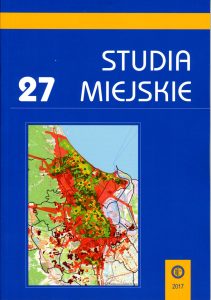Logistyczne aspekty koncepcji smart city. Studium przypadku na podstawie miast europejskich
Logistics aspects of smart city concept. A case study of selected european cities
Author(s): Jagienka Rześny-Cieplińska, Małgorzata Wach-KloskowskaSubject(s): National Economy, Public Finances, Socio-Economic Research
Published by: Uniwersytet Opolski
Keywords: city logistics; smart city concept; smart city solutions
Summary/Abstract: The number of urban residents is growing by nearly 60 million people every year. It is estimatedthat by the year 2050 2/3 of the world population will have been urban. The increasing urbanisationrequires new and innovative ways to manage the complexity of urban living and to target problems of energyconsumption, resource management and environmental protection. These problems are essential for citylogistics. The field concerning coordination and synchronization of the flows within the urban areas is gainingstrategic importance. Activities in European cities that are going to improve city logistics are includedas a part for the smart city idea.Scope: At the beginning, this paper will introduce the background of the smart city concept, as well asits meaning in the logistics-related aspects of city management. Then, through the case study, it will presentsolutions that make European cities smart. Moreover, using the background of the significance of theconcept of a smart city and its applications in the European reality, the author will analyze the possibilitiesof four Polish cities (Rzeszow, Gdansk, Cracow and Bialystok – recognised as the smartest Polish cities) forapproaching the smart city concept standards in the European dimension.Methodology: The methodology of the paper is based on two dimensions: analysis and synthesis. The firstphase included a thorough thematic literature review, an analysis of case studies of European and Polish smartcities. It was complemented by interviewing city board representatives of the examined Polish cities. In thesynthetic phase, the study provided conclusions based on the theoretical analysis and the survey of the casestudy.
Journal: Studia Miejskie
- Issue Year: 2017
- Issue No: 27
- Page Range: 129-141
- Page Count: 13
- Language: English, Polish

